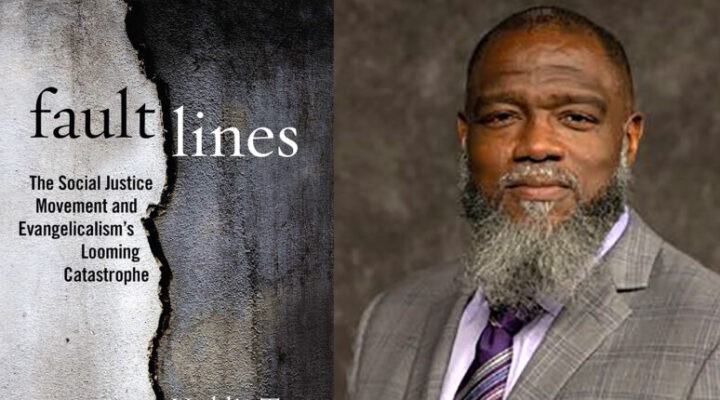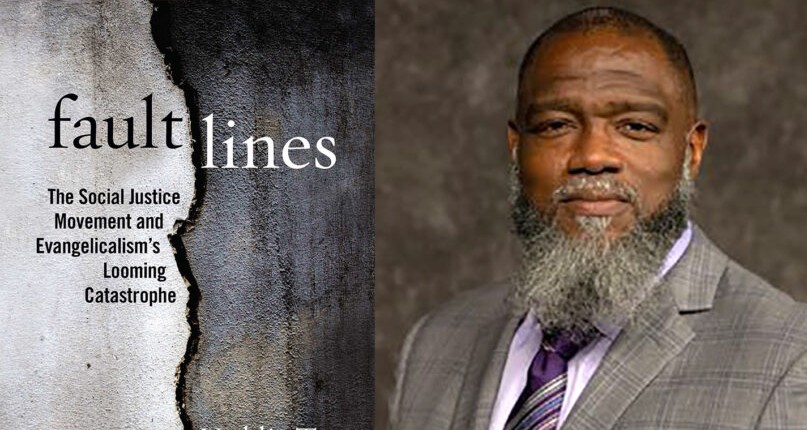After Baptist News Global broke the news that Voddie Baucham was being asked to accept a nomination to become the next president of the Southern Baptist Convention, the Theobros could hardly contain their excitement.
Owen Strachan tweeted: “What Voddie saw TEN YEARS AGO, many evangelicals still refuse to see. A decade ago, with little support, Voddie stood up and named the approaching monster. He dared to speak. He sacrificed popularity, position, & money to tell the truth. Recognize a warrior when you see one.”
He went on to prophesy: “200 years from now, no one who studies church history will know the names of the woke critics of Voddie Baucham. But they’ll know Voddie’s name. They’ll know it because of the God he faithfully proclaimed in faithless times. Be assured of that.”

Rick Pidcock
Of course, Baucham himself has similarly swooned over Strachan in his review of Strachan’s book Christianity and Wokeness, saying, “Few men possess the mix of intellect, winsomeness, academic rigor, pastoral sensitivity, and raw courage that drips from every page of this book.”
Strachan, former president of the Council on Biblical Manhood and Womanhood, is a vocal complementarian who, like Baucham, often rails against the feminization of men and the wokeness of the social gospel.
But despite Strachan and Baucham’s love fest for one another, not everyone is fantasizing about Baucham’s potential rise to leadership in the SBC. Even some SBC insiders and traditionalists are concerned about Baucham’s influence. His potential candidacy is supported by the Conservative Baptist Network, a far-right group in the already very conservative world of the SBC.
Whether Baucham is even eligible to run for SBC president is in question, as he lives overseas and is not a member of a U.S.-based SBC church. He also has been accused of plagiarism and misquoting others in his latest book, charges he and his publisher deny.
For a denomination that sees itself as a champion of family values, one would assume they would aspire to nominate and elect a leader who is a warrior for the family.
“Unfortunately, when it comes to the family, Baucham has consistently revealed himself to be a warrior for ignorance and a peddler for the monster of violent male power.”
Everyone recognizes, as Strachan pointed out, that Baucham is a warrior. In fact, we also recognize Baucham naming the approaching monster. Unfortunately, when it comes to the family, Baucham has consistently revealed himself to be a warrior for ignorance and a peddler for the monster of violent male power.
Voddie Baucham peddles ignorant, violent power over children
Baucham’s ignorant, violent power peddling begins with how his theology of original sin shapes his understanding of infants and his punishment of children.
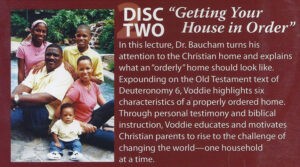 In one sermon, Baucham explains to the roaring laughter of the crowd: “People who don’t believe in original sin don’t have children. … That’s a viper in a diaper. The angry cry happens early. The demanding cry happens early. The stiffening up of the body, that happens early. … One of the reasons God makes them so small is so that they won’t kill you. And one of the reasons he makes them so cute is so that you won’t kill them.”
In one sermon, Baucham explains to the roaring laughter of the crowd: “People who don’t believe in original sin don’t have children. … That’s a viper in a diaper. The angry cry happens early. The demanding cry happens early. The stiffening up of the body, that happens early. … One of the reasons God makes them so small is so that they won’t kill you. And one of the reasons he makes them so cute is so that you won’t kill them.”
R.L. Stollar, a child liberation theologian who advocates for survivors of abuse, details how Baucham’s comment was borne from a theology that combines the Calvinistic doctrine of total depravity with the complementarian doctrine of patriarchy in order to position men as animal control and police officers over their children. Stollar notes that according to Baucham, “Parents … must treat their children as criminals deserving of restraint … must expect and see the worst in their children … should assume (children) are disagreeing because they are naturally covetous and murderous … (and) must also threaten their children with eternal torture in the flames of hell.”
Stollar shows how, “to Baucham, children and serial killers should be placed in the same category of depravity: the category of total depravity. … Infants are so naturally evil that they would kill their parents in their sleep if they were larger.”
 Baucham’s proposed solution for this hypothetical murderous infant drive is that “they desperately need to be spanked. And they need to be spanked often. … There were days when Junior needed to be spanked five times before breakfast. … You need to have an all-day session where you just wear them out.”
Baucham’s proposed solution for this hypothetical murderous infant drive is that “they desperately need to be spanked. And they need to be spanked often. … There were days when Junior needed to be spanked five times before breakfast. … You need to have an all-day session where you just wear them out.”
Baucham has gone so far as to give an example of a shy little pastor’s daughter who was afraid to shake a male deacon’s hand at church. Baucham described: “Pastor goes back in the office, goes through that whole process — spank the child, comes back out, child won’t do it again. Goes back again, asks the deacon, ‘Will you please wait here?’ Thirteen times. Thirteen times. That deacon was like, ‘Little girl, please … .’”
Baucham offers no compassion and no awareness of the complexities of what babies and children experience in their minds and bodies. He is completely ignorant of the trauma his violent beating has on little girls. Instead, he flexes his absolute patriarchal power over children, labels every failure of complete instantaneous submission as murderous depravity, and solves the problem through physical violence with the threat of eternal violence.
Voddie Baucham peddles ignorant, violent power over women
For Baucham, the patriarchy is a term to die for. In a sermon titled “The War Against the Patriarchy,” he said: “There’s also the war against the patriarchy, the war against male headship, which again is an assault on the God of the Bible. The woman is made after the man — male headship. The woman is made for the man — male headship. The woman is brought to the man — male headship. The woman is named by the man twice … male headship.”
In a sermon titled “The Permanence View of Marriage,” Baucham says, “There’s a person who’s in an abusive marriage. That is not biblical grounds for divorce and remarriage.”
In this instance, Baucham reveals himself to be one of the most extreme voices of complementarianism.
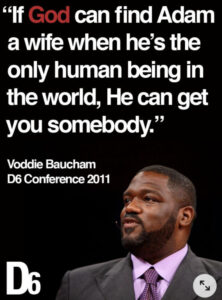 Fellow complementarian and Calvinist pastor John Piper has stated: “If it’s not requiring her to sin but simply hurting her, then I think she endures verbal abuse for a season, and she endures perhaps being smacked one night, and then she seeks help from the church. Every time I deal with somebody in this, I find the ultimate solution under God in the church.”
Fellow complementarian and Calvinist pastor John Piper has stated: “If it’s not requiring her to sin but simply hurting her, then I think she endures verbal abuse for a season, and she endures perhaps being smacked one night, and then she seeks help from the church. Every time I deal with somebody in this, I find the ultimate solution under God in the church.”
In 2019, Wayne Grudem — one of the founding fathers of contemporary complementarianism — changed his mind about prohibiting divorce in cases of abuse after hearing of a few instances of abuse and doing a word study of 1 Corinthians 7:15.
Of course, neither of these men understand the depths of the problem of marital abuse or go nearly far enough to deal with it. Regarding Grudem’s change of mind, Emily Hunter McGowin said, “The case for divorce in the instance of an abusive spouse did not need to be made by a word study and reinterpretation of 1 Corinthians 7:15 A reading of the whole canon should have led Grudem (and others) to the same conclusion long ago. … For many of us, the idea that Grudem has just now become aware of such stories seems truly incredible.”
But Baucham hasn’t even evolved to where Piper and Grudem are. He shares no awareness of the complexities of abuse and fails to take into account the broader biblical narrative about protecting the vulnerable and liberating the oppressed. Instead, he simply asserts male power over women, even in the case of abuse, by using the Bible to punish women with life sentences to abusive men.
Voddie Baucham peddles ignorant, violent power over daughters
In a sermon where Baucham pretends to have a conversation with a young man looking for a submissive woman to marry, he imagines telling the young man, “Watch her with her father.” When the imaginary suitor says that Baucham doesn’t know the father’s relationship with her, Baucham responds, “I don’t care.” When the imaginary suitor says there may be mitigating circumstances, Baucham responds, “I don’t care because a daughter’s submission to her father is not based on her father’s worthiness. It’s based on God’s command. … If she doesn’t submit to her father because her father is flawed, then she will not submit to you because you too, sir, are flawed. And if you marry an unsubmissive woman, you’re in a world of hurt.”
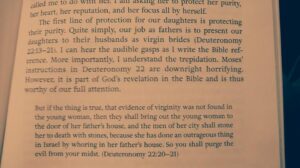 In one very creepy moment that has been making the rounds on social media lately, Baucham takes his convergence of submissive daughters and wives to include men leaving their wives for younger women, saying: “A lot of men are leaving their wives for younger women because they yearn for attention from younger women. And God gave them a daughter who can give them that. And instead, they go find a substitute daughter. … We’ve all seen it. These old guys going and finding these substitute daughters.”
In one very creepy moment that has been making the rounds on social media lately, Baucham takes his convergence of submissive daughters and wives to include men leaving their wives for younger women, saying: “A lot of men are leaving their wives for younger women because they yearn for attention from younger women. And God gave them a daughter who can give them that. And instead, they go find a substitute daughter. … We’ve all seen it. These old guys going and finding these substitute daughters.”
Baucham has a pattern of being transparent about his power over his daughter. In one sermon, he said, “Everybody wants to know, ‘Well, where’s she going to college?’ She’s not.” Then he made dry heaving sounds to the roaring laughter of the audience.
Baucham and his daughter, Jasmine, are featured in a documentary about “stay at home daughters,” a term given to daughters who stay at home to submit to and serve their fathers until the day they get married to submit to and serve their husbands.

Screen capture of Voddie Baucham with his daughter Jasmine in a documentary about his views on daughters in the home.
Return of the Daughters opens with an image of Eve eating a piece of fruit and says, “Since the beginning, women have been making decisions that affect the entire world. … It all starts with what women do in the home.” It claims that “girls are confused about where they fit into the world, even into their own families.” Rather than getting a college education and pursuing a career, the documentary follows women who “are rejecting the unloving demands of modern culture … (and) who are attempting to return to a family centered approach to womanhood … living productive lives in their father’s home until marriage.”
The documentary says Baucham’s daughter wanted to be a leader. “I wanted to be a screenwriter. I wanted to go to New York University. I wanted to get a scholarship. I wanted to be a single, powerful woman,” she confessed.
But the narrator shares, “Jasmine and her father have re-evaluated her ambitions and the family’s ambitions in light of their scriptural discoveries.”
“I still had a vision. And I was still living my life with purpose. But the difference was that I wasn’t happy because, I guess, deep down, well, I know the Holy Spirit was convicting me,” Jasmine remembers with a hint of unease in her words. “And so while I was going along this track, I was feeling kind of insecure, all of these anxieties. But now, instead of working against my father, instead of, kind of, going behind his back with my own plan, I’m working with him. And there’s so much more harmony in the house.”
“I always needed my father. But it was something that I fought against. It felt weak. It felt wrong. And now that I’m growing older and now that I’m gaining more of an understanding about biblical womanhood in the home, both as a daughter and in the future as a wife, it does increase my dependency. And I don’t see that as a bad thing. I see that as a good thing.”
 Baucham himself steps in at this point to explain: “Interestingly enough, the Bible doesn’t command women to become independent. It commands them to be submissive. Why? Well, because part of the curse in Genesis chapter 3 is that Eve would have a desire, not just for her husband, but literally in the Hebrew for her husband’s position. It is part of the fallen nature, as a result of what happened with our first parents that women have this desire against the order that God ordained toward independence. So for me to foster that in my daughter is really for me to flirt with that very same thing that brought Eve down. And so what I need to foster in my daughter is not the sin to which she’s prone. I need to foster the biblical pattern that she must learn.”
Baucham himself steps in at this point to explain: “Interestingly enough, the Bible doesn’t command women to become independent. It commands them to be submissive. Why? Well, because part of the curse in Genesis chapter 3 is that Eve would have a desire, not just for her husband, but literally in the Hebrew for her husband’s position. It is part of the fallen nature, as a result of what happened with our first parents that women have this desire against the order that God ordained toward independence. So for me to foster that in my daughter is really for me to flirt with that very same thing that brought Eve down. And so what I need to foster in my daughter is not the sin to which she’s prone. I need to foster the biblical pattern that she must learn.”
The narrator rejoices, “Instead of pursuing an independent career, Jasmine’s deliberate new objective is to join her family in helping fulfill her father’s vision.”
“Jasmine has gifts. She has abilities,” Baucham celebrates in his nice clean home. As video plays of Jasmine cooking for him, Baucham continues, “And those are being developed as she works with and serves her father. I don’t know why we allow ourselves to be forced into the world’s mold that somehow says to go out and pour your life into a stranger in order to build the ministry or the business of a stranger equals freedom, equals liberty, equals fulfillment, but to do so with the man to whom God has entrusted you as your father is a waste. It’s ironic. If you think about the fact that a woman gives up other career opportunities to serve a man, but you say it about Condoleezza Rice, she’s a hero. Because that’s precisely what she does for George Bush. She commits herself to his vision, not her own. She speaks the words of his agenda, not her own. She submits herself to him. For her to do that somehow makes her a hero. But for Jasmine to do that with her father somehow calls her into question.”
The narrator continues rooting the entire theology in the created order: “The creation account in Genesis 2 shows that the woman was created for the man, to be the perfect and complementary helper suitable to man and his vision. Being supportive and helpful is thus innate to women. Helping is not a role or disposition a woman assumes only upon marriage. This position is in no way an inferior position. It is an essential position, completing God’s design of mankind — male and female working together to represent God’s rightful authority and dominion over all things.”
“Being supportive and helpful is thus innate to women.”
In other words, Baucham uses the theology of God’s dominion over all things in order to give men dominion over all women, married or not.
Baucham concludes: “There is an epidemic of unprotected women in our culture. … It’s as though we just send these helpless creatures out there on their own and say, ‘OK baby, now it’s time for you to fend for yourself.’ … I will protect my daughter with my last breath if it’s necessary. … We are stewards when it comes to her life and her mind. And it’s our responsibility to protect that life, to protect that mind.”
Women are helpless creatures? Women are babies? And how does Baucham view babies? He says babies are “vipers in diapers,” that children are totally depraved criminals who “desperately need to be spanked.”
Notice how often men in power develop theologies of authority and dominion rooted in “the created order” and then try to brand it as protection. Baucham’s entire theology is about fathers having dominion and authority over their wives and daughters who submit to and serve them. It is not a theology about protection, but of power. So replace his word “protect” with the word “control,” and you will see Baucham’s unbranded truth: “I will (control) my daughter with my last breath if it’s necessary. … It’s our responsibility to (control) that life, to (control) that mind.”
Will the real Voddie Baucham please stand up?
Eventually Jasmine Baucham got married and reflected on her involvement with the Return of the Daughters documentary as well as her first book. Despite the language of power her father used throughout the documentary, Jasmine writes, “No, there will not be a dramatic, tell-all essay released about my abusive past, because it doesn’t exist. But also, no, I am not and never was part of some sacred stay-at-home cult.”
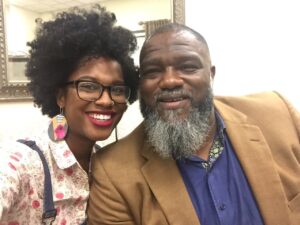
Jasmine with her father in 2019.
She went on to write that she is “really embarrassed” by how the documentary was used to bring “shame and insecurity in so many lives, including my own.”
She explains: “My dad is not an abusive, overbearing ogre who dictated every decision of my life” and that it was actually her dad who “forced me to get my license” and “pushed me to get an online degree.” And now that she’s married, she says, ”I’ve never made decisions for myself.”
Perhaps some of what may be going on here is a lack of awareness on Jasmine’s part for the depths of abuse she suffered under the dominion of her dad and may still be suffering under her husband with her continued lack of an ability to make decisions for herself. If so, hopefully she’ll eventually begin the healing process of discovering and grieving that through therapy.
But one does wonder if there is a difference between the Voddie Baucham we all see on stage boasting of dominion and power and the Voddie Baucham in the home. When the stage lights dim and the living room lamp turns on, could the peddler of power actually be a hardened shell that is trying to protect, not his daughter, but the wounded child within himself?
What Voddie Baucham really needs
As Baucham’s potential candidacy for the presidency of the SBC takes shape, many will focus on his responses to accusations of plagiarism. Others will focus on his rebranding of slavery as God’s providence to allow him to be “born in the center of the universe, in the greatest nation that has ever existed.”
But as Howard Thurman said in Jesus and the Disinherited about the “tax collector enemy” who betrays his own people: “Jesus demonstrated that the only way to redeem them for the common cause was to penetrate their thick resistance to public opinion and esteem and lay bare the simple heart. This man is not just a tax collector; he is a son of God. Awaken that awareness in him and he will attack his betrayal as only he can — from the inside.”
“Baucham doesn’t need to be nominated for even more power over a denomination that claims to be about family values. He needs to go to therapy.”
Voddie Baucham is indeed a peddler of violent male power. But beneath that thick, hardened shell of male power is a frightened child and someone who has lost touch with the divine feminine within himself. And that’s why he promotes the abuse of children, women and daughters.
Accusations of plagiarism are the least of Baucham’s concerns.
We can expose Voddie Baucham all day long. There is plenty of material here to work with.
But Baucham doesn’t need to be nominated for even more power over a denomination that claims to be about family values. He needs to go to therapy. The work of healing he needs to have in order to attack his betrayal of children, women and daughters is an awakening that he will realize only when he’s ready to attack the shell around his inner child and the divine feminine within himself.
Rick Pidcock is a 2004 graduate of Bob Jones University, with a bachelor of arts degree in Bible. He’s a freelance writer based in South Carolina and a former Clemons Fellow with BNG. He recently completed a master of arts degree in worship from Northern Seminary. He is a stay-at-home father of five children and produces music under the artist name Provoke Wonder. Follow his blog at www.rickpidcock.com
Related articles:
How a student’s fashion design project upset the created order at Bob Jones University | Analysis by Rick Pidcock
White evangelical leaders who repress women are revered as saints, author says
The seeds of evangelical angst over gender and sex were sown decades ago

